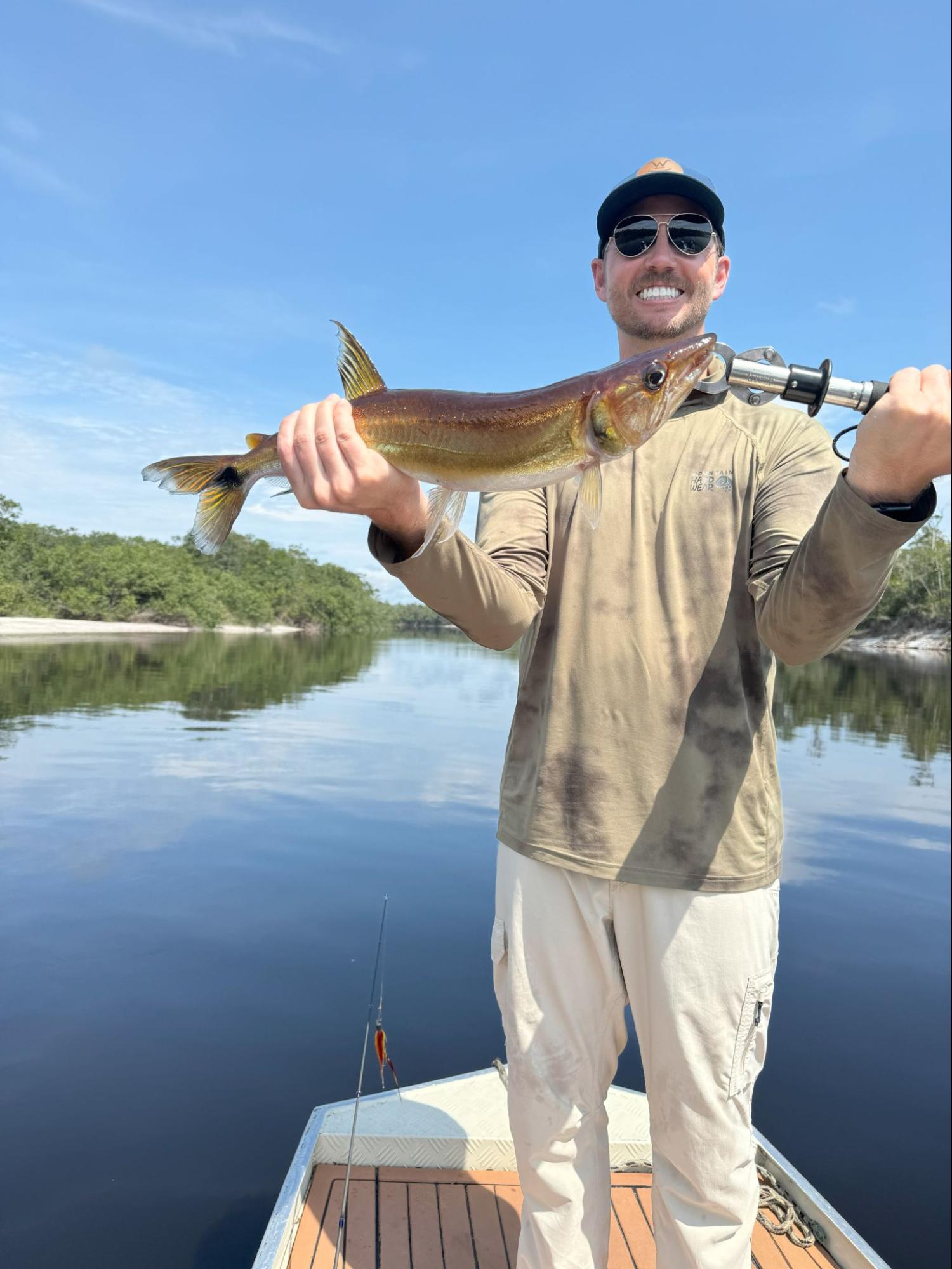[email protected] | 866-832-2987
Dogfish
The Freshwater Barracuda of the Amazon
Dogfish
The Silver Dragon of the Amazon
Guide
Lean, toothy, and built for blistering speed, the dogfish is one of the Amazon’s most underrated and electrifying predators. Often called the “freshwater barracuda,” Acestrorhynchus falcirostris is a sleek, silver missile with a mouth full of razor-sharp teeth and a hair-trigger strike reflex. These predators belong to the Acestrorhynchidae family, a group of mid-sized characins known for their lightning-fast attacks and piscivorous diets.
Dogfish are most commonly encountered in clearwater tributaries and transitional whitewater rivers, where their stealthy vertical barring and translucent fins help camouflage them in open water. Although rarely the target of a fishing trip, they are a thrilling incidental catch—especially for anglers throwing small jigs, plugs, or streamers on light tackle. Their speed, aerial acrobatics, and cut-through-anything bite make them a standout on the fly or ultralight setup.
Interesting Facts & Notes
Dogfish are one of the fastest freshwater fish in the Amazon relative to body size.
They belong to a unique family found only in South America—Acestrorhynchidae.
Their conical teeth and rigid jaws are adapted to grip slippery baitfish with extreme efficiency.
Despite their small size, they often leap during the fight and tear through soft plastics or light mono.
Where to Catch
Dogfish are frequently caught while targeting other species like peacock bass or bicuda. You’ll find them on:
Occasionally caught on Peacock Bass Fishing Trips
Quick Facts
| Attribute | Description |
|---|---|
| Scientific Name | Acestrorhynchus falcirostris |
| Common Names | Dogfish, Freshwater Barracuda, Cachorrinho |
| Size Range | 1–4 lbs (occasionally larger) |
| Region | Central and eastern Amazon Basin |
| Habitat | Clearwater and whitewater rivers; mid-depth and surface zones |
| Behavior | Solitary ambush predator |
| Coloration | Silver with pale vertical bars; translucent fins and deeply forked tail |
| Aggression | High – attacks fast-moving prey with precision |
| Feeding Habits | Primarily baitfish; occasionally insects or small crustaceans |
| Gamefish Status | Moderate – highly valued for light tackle and fly fishing |
Physical Appearance
Dogfish are slim and torpedo-shaped, built for high-speed pursuits. They have a silvery body with faint vertical bars along the flanks, a long pointed snout, and a forked caudal fin. Their jaw structure features interlocking conical teeth and a pronounced lower jaw, giving them a distinct barracuda-like profile.
How to Identify Dogfish
Slight vertical barring along silver sides, large eyes, and moderately deep body
Smaller overall size with a shorter snout, commonly found in backwater areas
Extended, more pointed snout with less distinct vertical bars
Fishing Tactics: How to Catch Dogfish
Dogfish are classic ambush predators and respond aggressively to anything that imitates a baitfish.
Recommended Techniques
Cast small diving plugs or spoons across current seams and mid-river eddies
Retrieve jigs quickly through backchannel runs or slackwater near structure
Use flashy streamers on floating or intermediate fly line for visual surface strikes
Suggested Gear
Rod: Medium-light spinning rod or 6–8 wt fly rod
Line: 20–40 lb braid or floating/intermediate fly line
Leader: 50–60 lb fluorocarbon or light wire (to prevent bite-offs)
Hooks: 1/0–3/0 J-hooks or streamer hooks
Because they often slash through light leaders, wire or heavy fluorocarbon is highly recommended—even when fishing for other species.
Related Reading

Join The Adventure
Fast, toothy, and flashy—dogfish deliver unexpected thrills in the heart of the Amazon. Add this freshwater missile to your catch list!
Contact us today:
📞 (866) 832-2987
References
Goulding, M. (2000). Fishes of the Amazon and Their Environment. INPA Press.
FishBase (2024). Acestrorhynchus falcirostris profile. www.fishbase.org
Zeinad, A. K. & Prado, R. A. (2012). Peixes fluviais do Brasil: espécies esportivas
Acute Angling guide field observations and catch records
